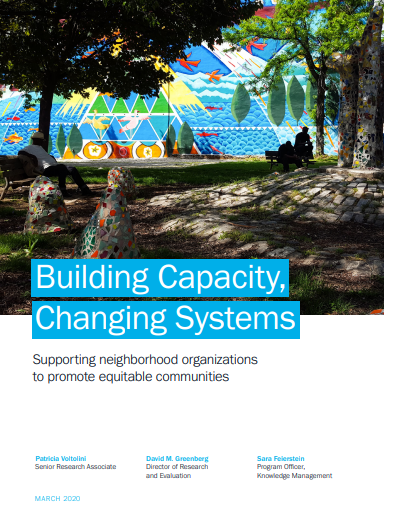Building Capacity, Changing Systems
This LISC research report looks at efforts of intermediaries to advance equity considering the needs of local organizations and also citywide actors and the public sector. The goal is to learn how intermediaries can build the capacity of entire systems to promote equitable outcomes.
Executive Summary
Since its inception in the 1960s the community development movement has made significant progress throughout the country. Community-based organizations have helped spark revitalization of many low-income neighborhoods and make local government more just and inclusive by advocating for policies that support residents in historically disinvested communities of color. Yet despite these gains, the needs of low-income communities continue to evolve and in many instances have increased. Community organizations are working to dismantle these inequalities, but many groups lack basic funding to sustain their ongoing, difficult work, let alone additional resources to pursue innovative strategies to meet new challenges. Compounding these problems, resources to build the capacity of community organizations are proven to be effective, but remain quite limited in scale.
Community development intermediaries have historically played a crucial role in growing and establishing the community development sector as a whole, not just by providing technical assistance and funding to local organizations, but also by helping orient the public sector to better support community development corporations (CDCs) and their work. Yet there has been limited research on the strategies community development intermediaries currently employ to build capacity, and especially limited evidence about new approaches that can help community organizations and the public sector work together to address contemporary problems related to equity and inclusion.
In this paper we look at efforts of intermediaries to advance equity throughout the country, considering the needs of local organizations and also citywide actors and the public sector. Our main goal is to learn how intermediaries can build the capacity of entire systems to promote equitable outcomes.
Related

The Best Defense Against Inequality? Strong, Local Organizations
A look at our country’s fundamental requirement for strong local associations—a need identified by a famous observer of American democracy nearly 200 years ago.
